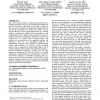Free Online Productivity Tools
i2Speak
i2Symbol
i2OCR
iTex2Img
iWeb2Print
iWeb2Shot
i2Type
iPdf2Split
iPdf2Merge
i2Bopomofo
i2Arabic
i2Style
i2Image
i2PDF
iLatex2Rtf
Sci2ools
104
click to vote
CANDT
2009
2009
Experiential role of artefacts in cooperative design
The role of material artefacts in supporting distributed and colocated work practices has been well acknowledged within HCI and CSCW research. In this paper, we show that in addition to their ecological, coordinative and organizational support, artefacts also play an `experiential' role. In this case, artefacts not only improve efficiency or have a purely functional role (e.g. allowing people to complete tasks quickly), but the materiality, use and manifestations of these artefacts bring quality and richness to people's performance and help them make better sense of their everyday lives. In a domain such as industrial design, such artefacts play an important role for supporting creativity and innovation. Based on our ethnographic fieldwork on understanding cooperative design practices of industrial design students and researchers, we describe several experiential practices that are supported by design-related artefacts such as sketches, drawings, physical models and explorat...
Artefacts Bring Quality | CANDT 2009 | Emerging Technology | Experiential Practices | Material Artefacts |
| Added | 15 Aug 2010 |
| Updated | 15 Aug 2010 |
| Type | Conference |
| Year | 2009 |
| Where | CANDT |
| Authors | Dhaval Vyas, Dirk Heylen, Anton Nijholt, Gerrit C. van der Veer |
Comments (0)

